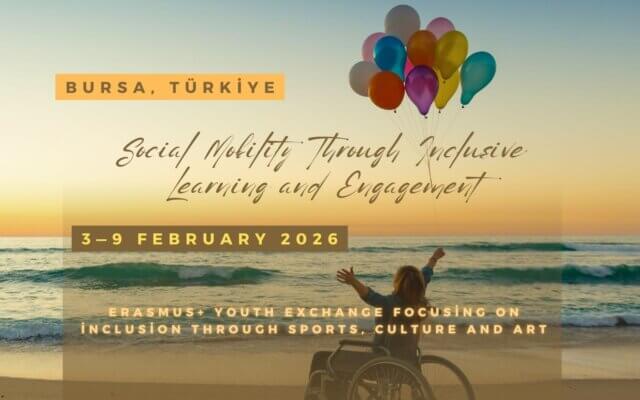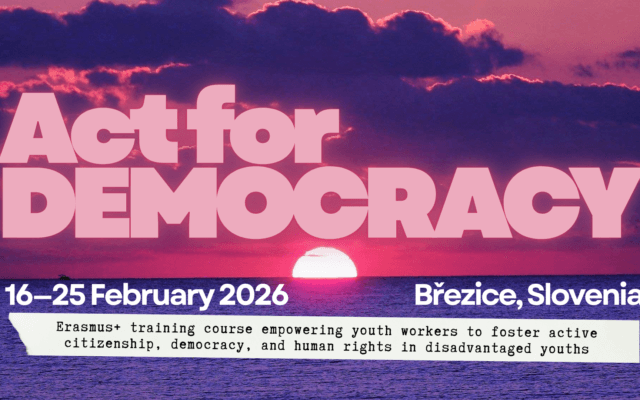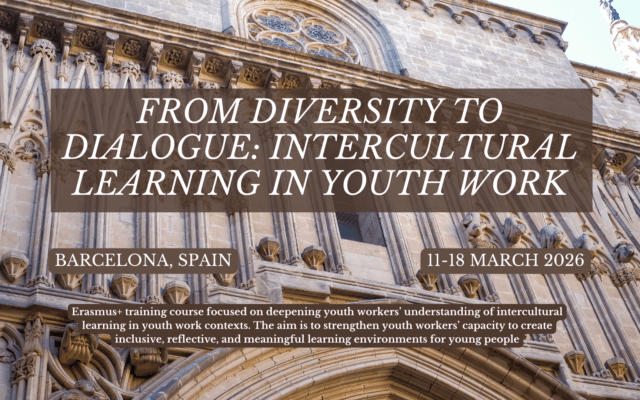Erasmus+, Klíčová Akce 1: tréninkový kurz
Časová osa této mobility:
-
Přípravné předprojektové setkání (Advance Planning Visit = APV): 11.—14. prosinec 2025, Sfântu Gheorghe, Rumunsko. Tohoto setkání se zúčastní jeden zástupce za český tým. V tomto termínu se setkají organizátoři se zástupci všech národních skupin, projdou si místo konání a proberou program aktivit nadcházejícího tréninkového kurzu. Místo na APV je obsazeno. Je možné se hlásit pouze na tréninkový kurz.
- Tréninkový kurz: 7.—15. únor 2026, Sfântu Gheorghe, Rumunsko
Český tým: 4 účastníci (ve věku 18+)
Před tím, než se přihlásíte na jakýkoliv náš projekt, důkladně si přečtěte všechny informace v sekci Chci vyjet na projekt a seznamte se s Pravidly účasti na zahr. projektech.
Pokud máte zájem se na tento projekt přihlásit, prosím důkladně si přečtete info-pack. Pokud máte zájem se na tento projekt přihlásit jako náhradníci, prosím odešlete vyplněnou přihlášku co nejdříve.
Pro to, abyste se na tento projekt přihlásili je nutné, abyste vlastnili nejen občanský průkaz (který musíte mít ze zákona), ale také platný cestovní pas (s platností min. ještě 150 dní od datumu začátku vámi vybraného projektu).
V rámci programu ERASMUS+ jsou následující finanční specifika: v rámci všech projektů je kompletně (ze 100%) zajištěno jídlo, ubytování, aktivity, a to vše je zcela pokryto z fondů EU programu ERASMUS+ a zařízeno organizátory. Účastníkům dále budou proplaceny cestovní náklady (reimbursement) z místa bydliště do místa konání projektu a to max. do výše €309/účastník.
Hostitelská organizace: TDA – Transilvania Development Agency
Popis projektu:
Erasmus+ training course enabling you to gain conflict prevention skills, fostering social inclusion, and intercultural understanding
Aim of this training course:
The overall aim of the project is to strengthen the capacity of youth workers to prevent conflicts, foster social inclusion, and promote intercultural understanding among young people from diverse backgrounds, including those with fewer opportunities. Through the development of emotional intelligence, effective communication skills, and conflict resolution strategies, the project seeks to create a network of empowered youth workers who can bring positive change in their local communities. Additionally, it promotes non-formal education as a key tool in building inclusive societies and uses the Erasmus+ programme as a platform for international cooperation in the field of youth work.
Objectives of the project:
- To improve participants’ understanding of emotional intelligence and its role in conflict prevention and resolution.
- To develop practical skills in active listening, empathy, and intercultural communication.
- To raise awareness about the importance of inclusion and the prevention of radicalization among young people.
- To equip youth workers with non-formal educational tools and methods to address and manage conflicts in their communities.
- To create opportunities for intercultural learning and cooperation among youth workers from 10 different countries.
- To encourage participants to multiply the knowledge gained by implementing at least 40 local follow-up activities in their home communities.
- To strengthen international partnerships and create the basis for at least 10 future collaborative projects.
Methodology:
The project is based on non-formal education and experiential learning methods, ensuring active involvement and meaningful interaction among participants. Activities include icebreaker games, energisers, and team-building exercises to foster trust and create a positive learning environment. Key topics such as emotional intelligence, conflict resolution models (3F, Thomas- Kilmann), and intercultural communication are explored through interactive workshops, role-plays, simulations, and the Theatre of the Oppressed method. Group discussions, World Café sessions, and case studies encourage participants to share experiences, reflect critically, and learn from diverse perspectives. The methodology promotes learning-by-doing, ensuring that participants acquire both theoretical knowledge and practical skills they can apply in their daily work with young people.


